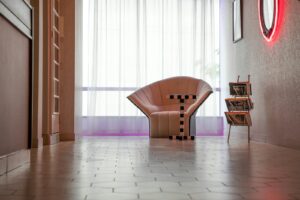Success of a vinyl flooring installation greatly depends on the adhesive chosen for the job. Selecting the right adhesive is crucial to ensure a long-lasting bond and a flawless finish. In this comprehensive guide, we’ll delve into the intricacies of choosing the best adhesive for vinyl flooring on various surfaces such as wood, concrete, and even walls.
Vinyl flooring adhesive serves as the backbone of any installation, providing the necessary bond between the flooring material and the substrate. Various types of adhesives are available, each with its own unique properties and suitability for different applications.
Pressure-sensitive adhesives offer flexibility and ease of installation, while water-based and solvent-based adhesives provide strong bonds suitable for different substrates.
When choosing an adhesive, factors such as substrate compatibility, installation method, environmental impact, and VOC emissions should be carefully considered.
Best Adhesive for Vinyl Flooring on Wood
Wood substrates present specific challenges for vinyl flooring installation due to their susceptibility to moisture and movement.
Opting for a moisture-resistant adhesive is essential to prevent issues such as warping and buckling. The adhesive should be compatible with wood finishes and offer ease of application and cleanup.
Some recommended adhesives for wood substrates include moisture-resistant formulas with low VOC emissions and superior bonding strength.
Pressure-Sensitive Adhesive (PSA): This type of adhesive comes in either pre-applied or applied-on-site forms. It remains tacky and allows for adjustments during installation, making it a popular choice for DIY projects. PSA adhesives are often used with luxury vinyl tile (LVT) and luxury vinyl plank (LVP) flooring.
Water-Based Adhesive: Water-based adhesives are environmentally friendly and emit fewer volatile organic compounds (VOCs) compared to solvent-based adhesives. They offer good bonding strength and are suitable for bonding vinyl flooring to wood subfloors. Water-based adhesives are easy to clean up with water, making them convenient for DIY installations.
Solvent-Based Adhesive: Solvent-based adhesives provide a strong bond and are suitable for high-traffic areas. They typically have a faster drying time compared to water-based adhesives, which can speed up the installation process. However, they may emit stronger odors and require proper ventilation during installation.
Modified Silane Polymer (MS) Adhesive: MS adhesives offer excellent adhesion properties and are suitable for various subfloor materials, including wood. They are moisture-resistant, making them ideal for areas prone to moisture exposure. MS adhesives typically have a low odor and are easy to apply.
Acrylic Adhesive: Acrylic adhesives are versatile and can bond well with wood subfloors. They offer good initial tack and bond strength, allowing for efficient installation of vinyl flooring. Acrylic adhesives are often used in both residential and commercial settings.
Best Adhesive for Vinyl Flooring on Concrete
Concrete surfaces require special attention during vinyl flooring installation to ensure a durable and long-lasting bond.
Concrete’s porous nature can lead to moisture issues, making it crucial to use adhesives equipped with moisture barriers. Crack-bridging adhesives are also recommended to prevent cracks from affecting the integrity of the flooring.
High-strength bonding agents are ideal for concrete substrates, providing a reliable bond that withstands heavy foot traffic and environmental factors.
Here are types of adhesives commonly used for installing vinyl flooring on concrete subfloors:
Pressure-Sensitive Adhesive (PSA): Designed for vinyl tile and plank installations, this adhesive remains tacky and allows for adjustments during installation.
PSA is favored for its tackiness, allowing adjustments during installation. This flexibility is crucial when aligning vinyl tiles or planks on concrete subfloors, ensuring precise placement for a seamless finish.
Water-Based Adhesive: Environmentally friendly option with low VOC emissions, suitable for vinyl flooring installations on concrete subfloors.
Known for its eco-friendliness and low VOC emissions, water-based adhesive is suitable for vinyl flooring installations on concrete subfloors. It provides a secure bond while minimizing environmental impact and indoor air pollution.
Solvent-Based Adhesive: Offers a strong bond and faster drying time compared to water-based adhesives, but may emit stronger odors.
While emitting stronger odors during application, they deliver robust adhesion, ideal for high-traffic areas or where a quick installation turnaround is necessary.
Polyurethane Adhesive: Provides a strong, durable bond and moisture resistance, suitable for luxury vinyl tile and plank installations on concrete subfloors.
Their durable bond withstands varying environmental conditions, ensuring long-lasting performance even in moisture-prone areas.
Best Adhesive for Vinyl Flooring on Walls
The trend of using vinyl flooring on walls has gained popularity in recent years, offering a unique aesthetic and practical benefits such as easy maintenance and durability.
When installing vinyl flooring on walls, special considerations must be taken into account. Adhesives with vertical hold properties are essential to ensure the flooring remains securely attached to the wall surface.
Low-odor and quick-tack adhesives are preferred for indoor applications, while adhesives suitable for textured surfaces provide a strong bond on uneven walls.
When installing vinyl flooring on walls, the type of adhesive you choose depends on several factors, including the type of vinyl flooring being used and the surface of the wall. Here are two common types of adhesives suitable for vinyl flooring on walls:
Pressure-Sensitive Adhesive (PSA): PSA is a popular choice for vinyl flooring installations on walls because it remains tacky and allows for adjustments during installation. It offers good initial tack, which helps hold the flooring in place while the adhesive sets.
Installing vinyl flooring on walls often requires precision and the ability to adjust the positioning of the planks or tiles. PSA provides the flexibility needed for vertical installations and helps ensure a secure bond between the vinyl flooring and the wall surface.
Vinyl-Specific Adhesive: Some adhesives are specifically formulated for bonding vinyl flooring to various surfaces, including walls. These adhesives typically provide strong adhesion and are designed to withstand vertical applications.
Vinyl-specific adhesives are tailored to the unique characteristics of vinyl flooring, ensuring a secure bond that can withstand the stress of being installed on walls. They offer reliable adhesion, even in vertical orientations, helping to prevent the flooring from peeling or shifting over time.
Read More
Vinyl Flooring for Bathrooms and Kitchens
Vinyl Plank Flooring vs Vinyl Sheet Flooring
Underlayment for vinyl plank flooring on concrete, plywood and hardwood
How to Properly Acclimate Vinyl Flooring Before Installation?





